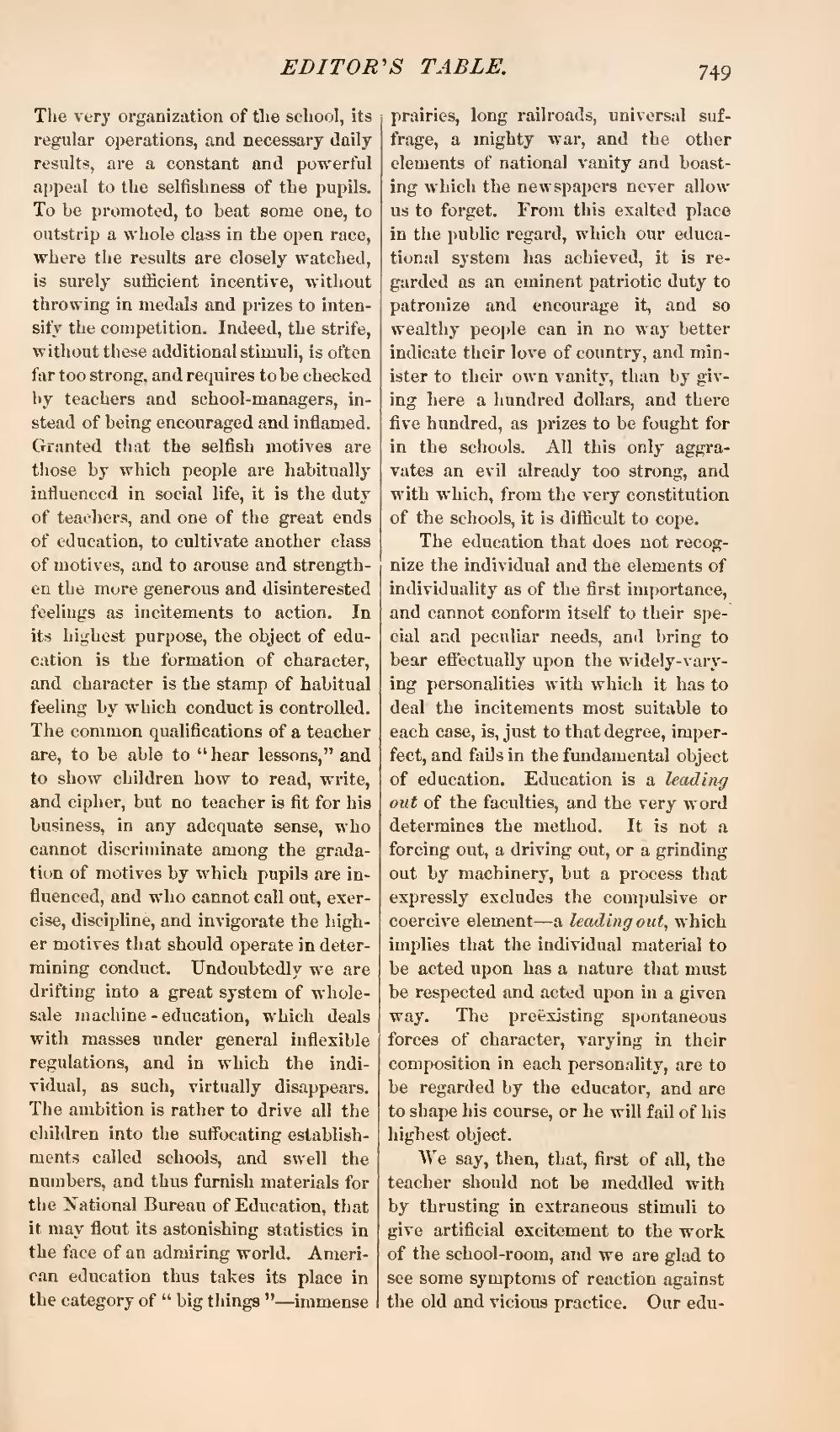The very organization of the school, its regular operations, and necessary daily results, are a constant and powerful appeal to the selfishness of the pupils. To be promoted, to beat some one, to outstrip a whole class in the open race, where the results are closely watched, is surely sufficient incentive, without throwing in medals and prizes to intensify the competition. Indeed, the strife, without these additional stimuli, is often far too strong, and requires to be checked by teachers and school-managers, instead of being encouraged and inflamed. Granted that the selfish motives are those by which people are habitually influenced in social life, it is the duty of teachers, and one of the great ends of education, to cultivate another class of motives, and to arouse and strengthen the more generous and disinterested feelings as incitements to action. In its highest purpose, the object of education is the formation of character, and character is the stamp of habitual feeling by which conduct is controlled. The common qualifications of a teacher are, to be able to "hear lessons," and to show children how to read, write, and cipher, but no teacher is fit for his business, in any adequate sense, who cannot discriminate among the gradation of motives by which pupils are influenced, and who cannot call out, exercise, discipline, and invigorate the higher motives that should operate in determining conduct. Undoubtedly we are drifting into a great system of wholesale machine-education, which deals with masses under general inflexible regulations, and in which the individual, as such, virtually disappears. The ambition is rather to drive all the children into the suffocating establishments called schools, and swell the numbers, and thus furnish materials for the National Bureau of Education, that it may flout its astonishing statistics in the face of an admiring world. American education thus takes its place in the category of "big things"—immense prairies, long railroads, universal suffrage, a mighty war, and the other elements of national vanity and boasting which the newspapers never allow us to forget. From this exalted place in the public regard, which our educational system has achieved, it is regarded as an eminent patriotic duty to patronize and encourage it, and so wealthy people can in no way better indicate their love of country, and minister to their own vanity, than by giving here a hundred dollars, and there five hundred, as prizes to be fought for in the schools. All this only aggravates an evil already too strong, and with which, from the very constitution of the schools, it is difficult to cope.
The education that does not recognize the individual and the elements of individuality as of the first importance, and cannot conform itself to their special and peculiar needs, and bring to bear effectually upon the widely-varying personalities with which it has to deal the incitements most suitable to each case, is, just to that degree, imperfect, and fails in the fundamental object of education. Education is a leading out of the faculties, and the very word determines the method. It is not a forcing out, a driving out, or a grinding out by machinery, but a process that expressly excludes the compulsive or coercive element—a leading out, which implies that the individual material to be acted upon has a nature that must be respected and acted upon in a given way. The preëxisting spontaneous forces of character, varying in their composition in each personality, are to be regarded by the educator, and are to shape his course, or he will fail of his highest object.
We say, then, that, first of all, the teacher should not be meddled with by thrusting in extraneous stimuli to give artificial excitement to the work of the school-room, and we are glad to see some symptoms of reaction against the old and vicious practice. Our edu-
